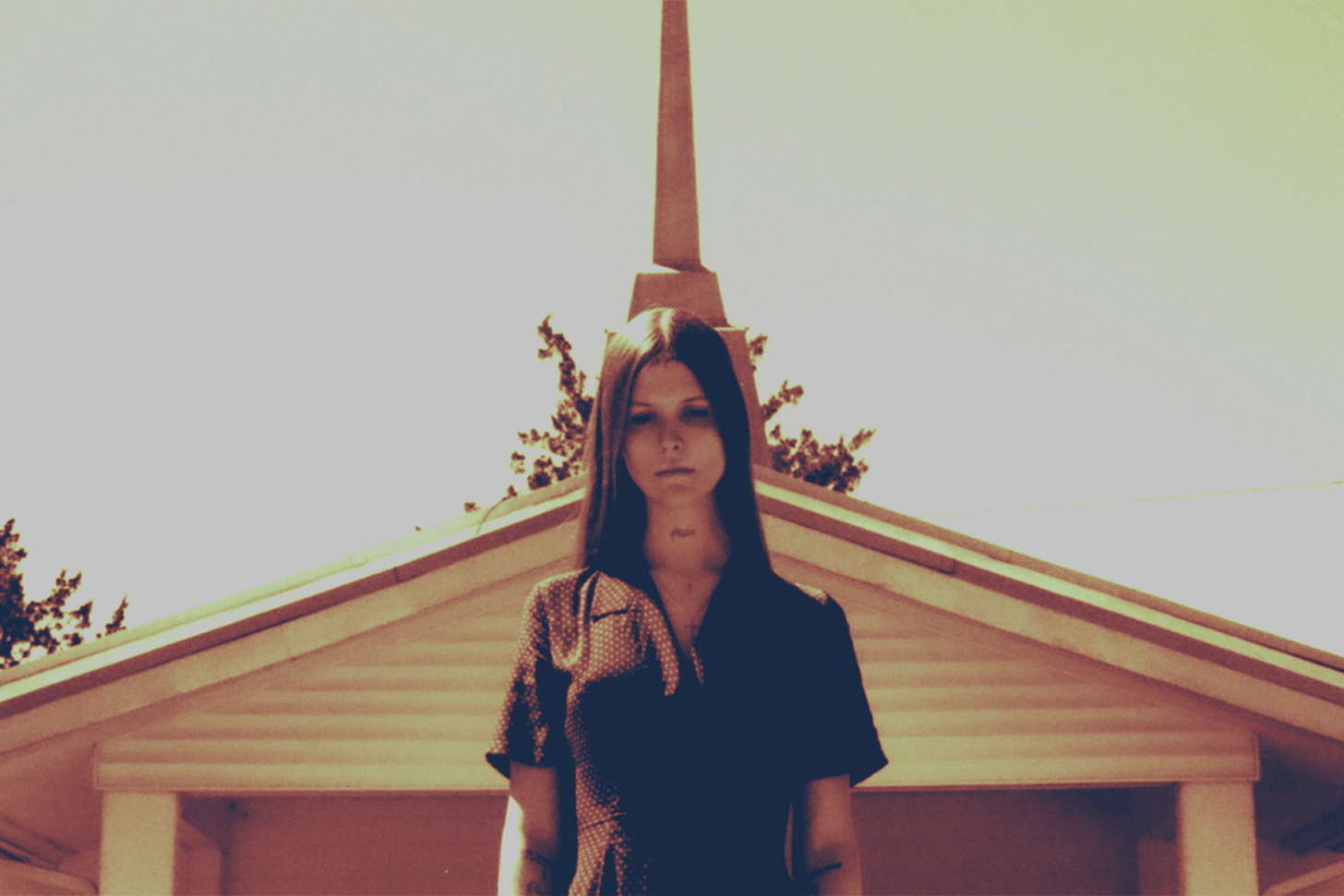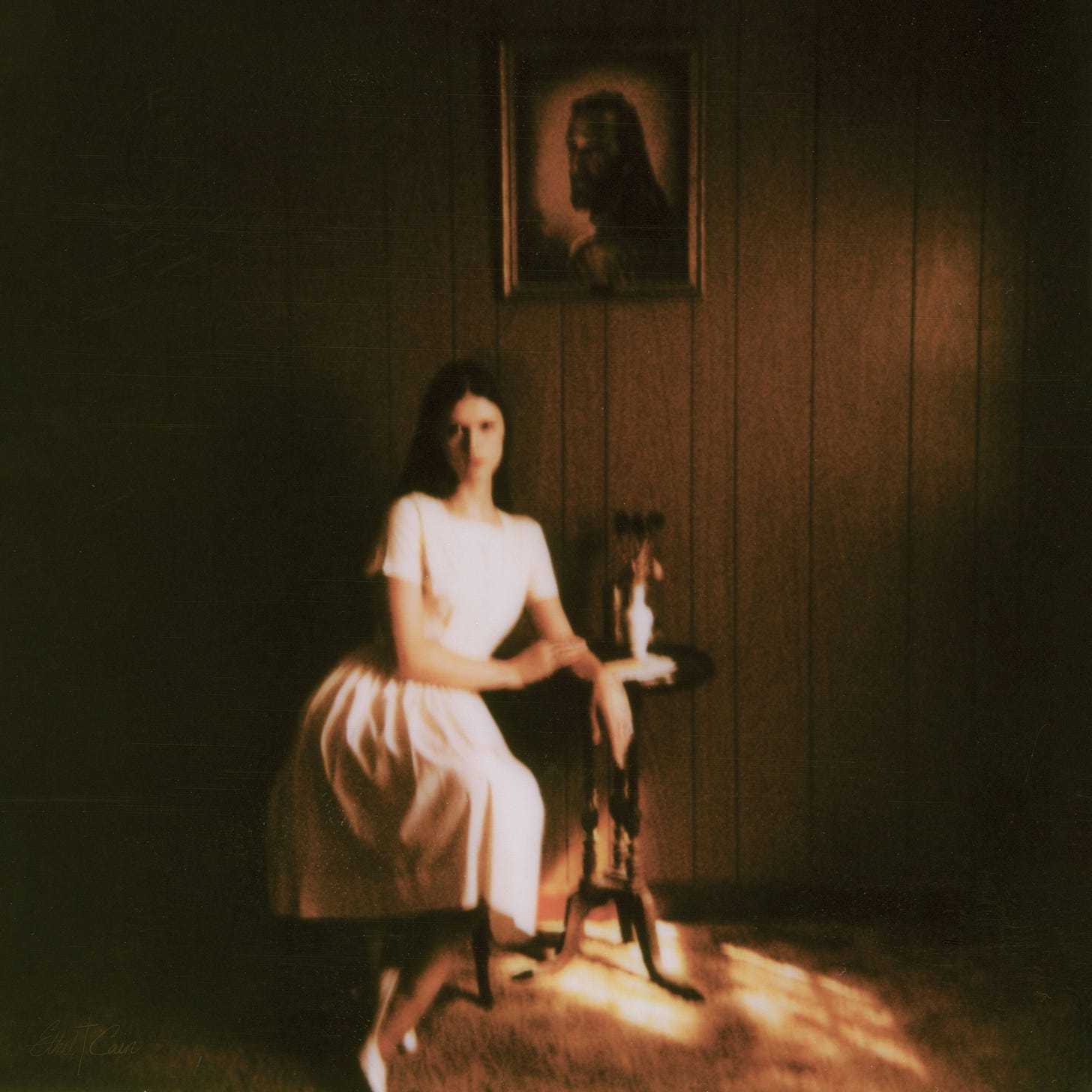The Face of Love's Rage - the musical horror storytelling of Ethel Cain's Ptolemaea
a closer look at Preacher's Daughter's most haunting track (which is a feat given that the entire album plays like a haunting)
Trigger warnings ahoy (abuse, cannibalism, religious trauma, family dynamics mainly), so tread safely.
So far, we’ve mainly talked about horror storytelling through the medium of film (with diversions to TV and books). But something I’ve been wanting to explore with you, dear reader, for a good while now is horror storytelling via music. I am a sucker for a “story-song” because successfully compressing a full story into the structure of a three minute (give or take) song and telling it to your audience in a satisfying way takes a deep mastering of your craft.
While I’ll happily delve into the history of the murder ballad in a future issue (or indeed one of my other all time favourite bits of horror storytelling in music, the album Murder Ballads by Nick Cave and the Bad Seeds, yes god let me do a sentence by sentence dissection of Where the Wild Roses Grow, I would ascend to my highest most annoying self), this time around we’re talking about a modern bit of musical horror storytelling that has been living rent fucking free in my head for the past six months now.
Come with me, as we dive headfirst into the world of Ethel Cain’s 2022 album Preacher’s Daughter and have a mutual freak out to its stand-out track, Ptolemaea…
but first, who the fuck is Ethel Cain?
Ethel Cain is the professional moniker of singer/songwriter/multi-disciplinary artist/model Hayden Silas Anhedönia. Anhedönia, born in Tallahassee and raised in Perry, is the eldest child of a Southern Baptist family, homeschooled and raised by a dad who was a church deacon. She left the church at the age of 16, after her coming out as gay sent shockwaves through the tight-knit and deeply conservative community. Feeling like an outsider, she found some form of catharsis in choirs and theatre programs. One of the few secular bits of culture she was allowed to interact with was horror movies, which her grandparents allowed her to watch as a sort of therapy for her anxiety.
Moving back to Tallahassee, she had a two-fold epiphany: she came out as trans, and she realized it was time to stake her own claim in the world and step into her power. Knowing that she wanted to become an artist, it was just a question of how this would manifest. She started making music in 2017.
The story of Ethel Cain as a project starts, as the story goes, one night in 2018. It is not clear exactly how it happened, but Anhedönia found herself possessed by a character (Ethel) and was moved to tell her story. She began releasing music under the Ethel Cain moniker in 2019, putting out three EPs and gaining traction through her unique sound.
The first full album, which delves into the story of Ethel Cain, was released in 2022, which brings us to…
a brief summary of Preacher’s Daughter
I won’t do a track by track deep dive of Preacher’s Daughter (I have linked to an excellent one by Far Out Magazine at the end of this issue) as I am wanting to focus on one specific song here, but you will need some context to work from. Over the space of thirteen tracks (running to a total of 1h15), Anhedönia brings us into the world of Ethel Leonora Cain. The only daughter of the late Rev. Joseph Cain, of Shady Grove, Alabama, we meet Ethel in 1991, a decade on from his passing. The album tackles themes such as isolation, sexual abuse, faith/a crisis of faith and dealing with the trauma encoded in DNA as Ethel paints us the picture of her life in Shady Grove, the heartbreak of losing her first great love, the wretched abuse she suffered at the hands of her father and her descent into darkness as she desperately tries and fails over and over again to cut ties with her past and leave.
Anhedönia uses a variety of styles ranging from bright indie rock to yearning, epic power ballads, to experimental instrumentals in order to tell her story. In order to understand where we’re at when we arrive at Ptolemaea, we need to look at the two songs which proceed it on the album.
Thoroughfare, a more upbeat, country-tinged song and the longest song on the album (9 minutes and 27 seconds), has on its surface notes of something Ethel has been direly missing before: hope. She has left Shady Grove, and is trying to find a lift to California. While hitchhiking, she is picked up by a man named Isaiah (a Biblical name meaning “salvation of the Lord”) who offers her a ride as he himself is setting out to look for the kind of love his dad had for his mother (which, given what we come to know about Isaiah later on, can mean a whole bunch of things and absolutely none of them are green flags). During the road trip, Ethel and Isaiah fall in love (Ethel sings 'Cause for the first time since I was a child/I could see a man who wasn't angry) and at the close, she seems for the first time on the album in a better place. However, all is not as it seems because somewhere in the space between Thoroughfare and the next song, Isaiah once again drags Ethel from the light, to a place darker than she’s ever been to.
Gibson Girl, the track which immediately proceeds Ptolemaea, is a slow, woozy, blues-tinged trip. Ethel sounds spaced out, almost like she’s not entirely in her own body, as she tells us about her relationship with Isaiah: he is pimping her out, gaslighting her tells her he’s fucking up her body because he loves it. Throughout the track, Ethel seems to want to put her abuse into a context of it feeling “downright iconic”, perhaps in a desperate desire to want it all to mean something, to be for something. The lines between what her thoughts are and what Isaiah is telling her to think blur on and on like ink in the pissing rain.
And then, just as the track builds to the album’s loudest point so far, the sound abruptly stops, leaving the song to peter out in silence and leading into…
Ptolemaea, dissected
Clocking in at six minutes and twenty-three seconds, Ptolemaea plays like an unfolding nightmare. Named after a section in the ninth layer of hell in Alighieri’s Dante’s Inferno (the layer reserved for traitors, specifically the section reserved for those who betray their guests) the song starts with with sparse, breathy moans, almost like we’re hearing someone (Ethel) in pain. At about 23 seconds in, over a thudding beat that sounds like a heartbeat, we hear an ominous male voice (Isaiah) talking:
I followed you in
I was with you there
I invited you in
Twice, I did
You love blood too much
But not like I do
Not like I doHeard you, saw you, felt you, gave you
Need you, love you, love you, love you
Isaiah tells Ethel that he twice invited her in to his life: once to see the west with him (as told in the lyrics to Thoroughfare) and once into his life in California. Is he also letting on that he followed her, watching as she was hitchhiking and seeking the lift to California? Was he with her even before she knew?
Isaiah tells Ethel that she “loves blood too much”, possibly implying that while she has been struggling throughout the album with her faith, she was still holding on to her faith despite everything she had been through, perhaps foolishly so (implied in the later line “God loves you, but not enough to save you” from Sun Bleached Flies). He tells her that while she loves blood too much, she does not love it like he does, which we can interpret as him thinking her blood as holy.
The repeated, almost whispered chant of heard you saw you felt you gave you need you love you is Isaiah’s insidious gaslighting at work, continuing to manipulate her by repeating these phrases even as Ethel is in and out of consciousness. The sound is distorted as we hear what Ethel hears - Isaiah’s voice is drowned out by buzzing flies (previously heard in the background of Family Tree) and we hear cries of pain (I highly recommend listening to this song with earphones/headphones on, it’s like ASMR from hell) before Isaiah menacingly states you’d do well to say yes to me, which the audio distorts to the point where it sounds like you’re hearing it through cotton wool.
Here, we hear Ethel’s voice again, as she faces the truth of what is happening. She’s been betrayed again by a man who she thought was her savior, this time in a way more horrendous than she could ever imagine.
Saying I'm the one, he's gonna take me
I'm on fire, I'm on fire, I'm on fire
Suffering is nigh, drawing to me
Calling me the one, I'm the white light
Beautiful, finite
Isaiah sees Ethel, the preacher’s daughter, as a perfect, pure yet fallible mythologized being and wishes to possess her completely. Ethel sings even the iron still feels the rot - a line Anhedönia has described as meaning “even the toughest, hardest things/people still fear the things that eat away at them and destroy them”. We can take this to mean that Ethel, even though she has survived so much the world has thrown at her, is still deeply afraid of what is happening and while it may seem inevitable that something would happen to her (again, thinking back to the “trauma encoded in DNA”) that doesn’t mean that she is not terrified.
You poor thing
Sweet, mourning lamb
There's nothing you can do
It's already been done
Said by Isaiah, again hinting at the seeming inevitability of it all, this section also hints at something happening in Isaiah’s head, perhaps a detachment as he sees himself as Isaiah the biblical prophet and no longer Isaiah the man.
What fear a man like you brings upon (Show me your face)
A woman like mePlease don’t look at me/I can see it in your eyes/he keeps looking at me
Ethel continues (with the “show me your face” interjection by Isaiah implying she is not looking at him directly), expressing her fears of the man before her, a man who has objectified her and hurt her but who she cannot leave. We can hear her getting more and more agitated, her voice pleading as Isaiah keeps looking at her like he is about to strike.
And then he does.
All coherent thoughts cease as Ethel is reduced to pleading with Isaiah to make it stop. This is where the song plays one of its two best hands, as a repeated, increasingly frantic plea for him to stop explodes in one singular, blood-curdling STOP before a shredding guitar riff drowns out cries and a repeated I am the face of love’s rage seals her fate.
It is a lot to take, this song, a deliberate buildup of sensory overload, so you’d be forgiven for not paying attention as the song plays that second hand: over a sound that can only be described as an organ played by your sleep paralysis demon, a voice (presumably Isaiah’s but hold that thought) reads out what is known in the Ethel Cain-verse (more on that in a second) as the Daughters of Cain sermon.
Blessed be the Daughters of Cain, bound to suffering eternal through the sins of their fathers committed long before their conception
Blessed be their whore mothers, tired and angry waiting with bated breath in a ferry that will never move again
Blessed be the children, each and every one come to know their god through some senseless act of violence
Blessed be you, girl, promised to me by a man who can only feel hatred and contempt towards you
Anhedönia has already stated plans to expand on the Cain-verse and tell the story of Ethel’s mother, as well as further flesh out Ethel’s story, and this sermon offers a fascinating glimpse into what we may find out in the future. Again, playing with that idea of trauma coded in the DNA, the sermon speaks of the Daughters of Cain being bound to suffering through sins of their fathers committed long before their conception. What has taken place in the further Cain lineage for this sermon to even exist? Is there a true curse, a supernatural element which has sealed the fate of generations of women before they even took their first breaths? Or is the curse a more human one, one of behaviors passed down unexamined over and over again?
I am no good nor evil, simply I am, and I have come to take what is mine
I was there in the dark when you spilled your first blood
I am here now as you run from me still
Run then, child
You can't hide from me forever
This is no longer the voice of Isaiah, but the voice of Death itself, speaking of just being, existing outside of the binaries of good/evil, here to take Ethel’s soul. Death mentions being there in the dark when Ethel spilled her first blood, which could be interpreted as when Isaiah first drew her blood as he attacked her, but could also be seen as Death having been there from the point where she got her first period. Or, and this is the interpretation that fascinates me the most (and certainly bears some weight as earlier in the album Ethel plainly states that she has killed before and will kill again and that she was not above violence even as a child, maybe as self defense against abuse even at such a young age) is that Death was there when Ethel first killed someone.
No matter the interpretation, Death implies that Ethel, even in her final moments, is still running from it, and as the song closes, Death states that she cannot hide from it forever.
The album follows the frantic sensory overload of Ptolemaea with two instrumental tracks (August Underground - named after the infamous 2001 exploitation horror - and Televangelism), doing away with words to guide us through Ethel’s final moments before bringing her voice back to close out the album on Sun Bleached Flies (on which she eventually makes peace with her death) and Strangers (in which we find out what happened to Ethel - it involves her body being in Isaiah’s basement freezer, and him being driven insane by what he’s done to the point where he performs the ultimate act of consumption and eats from her remains).
Strangers closes out on a message from Ethel to her mother, seemingly forgiving her and imploring her not to think about her death too much lest she never sleep again.
Preacher’s Daughter sees Anhedönia bring together a plethora of influences across mediums, drawing from a variety of musical styles as well as horror movies (her naming a track after August Underground is the clearest example and also suggests that she’s got a fucking strong stomach), she plays around and pushes the limits of what musical production can do. Ptolemaea, with its ASMR-like inaudible whispering and glitchy sounds, brings us into the woozy state of being Ethel is experiencing, hearing Isaiah’s words as if under water. To me, it is the stand-out track on the album as storytelling-wise it’s the climax of Ethel’s journey into darkness and it handles the weight of both its place in the narrative and of what’s actually happening beautifully.
If you haven’t yet heard Preacher’s Daughter and immersed yourself in the Ethel Cain narrative, consider this your taster session. I can only hope that I have convinced you to delve deeper.





